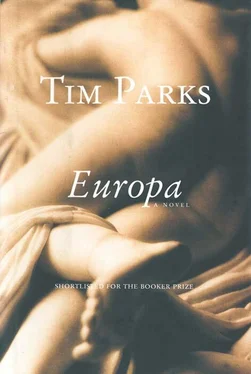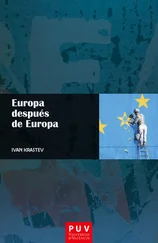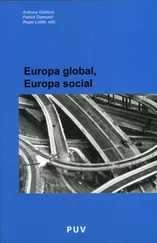Tim Parks - Europa
Здесь есть возможность читать онлайн «Tim Parks - Europa» весь текст электронной книги совершенно бесплатно (целиком полную версию без сокращений). В некоторых случаях можно слушать аудио, скачать через торрент в формате fb2 и присутствует краткое содержание. Год выпуска: 1999, Издательство: Arcade Publishing, Жанр: Современная проза, на английском языке. Описание произведения, (предисловие) а так же отзывы посетителей доступны на портале библиотеки ЛибКат.
- Название:Europa
- Автор:
- Издательство:Arcade Publishing
- Жанр:
- Год:1999
- ISBN:нет данных
- Рейтинг книги:3 / 5. Голосов: 1
-
Избранное:Добавить в избранное
- Отзывы:
-
Ваша оценка:
- 60
- 1
- 2
- 3
- 4
- 5
Europa: краткое содержание, описание и аннотация
Предлагаем к чтению аннотацию, описание, краткое содержание или предисловие (зависит от того, что написал сам автор книги «Europa»). Если вы не нашли необходимую информацию о книге — напишите в комментариях, мы постараемся отыскать её.
Europa — читать онлайн бесплатно полную книгу (весь текст) целиком
Ниже представлен текст книги, разбитый по страницам. Система сохранения места последней прочитанной страницы, позволяет с удобством читать онлайн бесплатно книгу «Europa», без необходимости каждый раз заново искать на чём Вы остановились. Поставьте закладку, и сможете в любой момент перейти на страницу, на которой закончили чтение.
Интервал:
Закладка:
Immediately I had finished speaking, Vikram roared with laughter. For Vikram Griffiths of course, despite his show of general bonhomie, despite his apparent couldn’t-give-a-toss attitude to losing his representative role on a trip which is entirely his own inspiration, loathes Barnaby Hilson. Vikram Griffiths loathes Barnaby Hilson in part because Hilson usurps his, Vikram’s, role of charismatic figure from much-loved ethnic-minority culture and in part because Hilson has a serious project in life and gets on with it, working hard in the mornings and pursuing an entirely stable and sensible private life with his rather older English wife, who is commendably jovial and practical, and their two small, doubtless delightful children, boy and girl. Vikram Griffiths, understandably, loathes Hilson, and now, quite probably in a fragile emotional state after having been voted out by his colleagues on this trip which was absolutely his own invention, and with a child-custody battle going on back in Italy with his first wife, a woman frequently obliged to seek psychiatric help, not to mention financial claims the second wife is making in their protracted and apparently extremely acrimonious separation proceedings, involving, amongst other things, the ownership of their ugly mongrel dog, he roared loudly with laughter, perhaps drunken laughter, and said, Compagni! I propose our English Jeremiah as a candidate! At least he can always quote the bastards someone they’ve never heard of! Upon which, immediately, without any mental mediation whatsoever, but rather as even a suicide might instinctively grasp at a rope thrown to him in swirling waters, I said okay, I would do it, if people wanted to vote for me. But I would need, I said — and how quickly one thinks when one doesn’t try, when one is possessed by one’s thoughts, rather than possessing — I would need somebody to advise me on what exactly I would have to say. I would need advice and help. From somebody who knew something about Europe. Surprisingly, Dimitra at once and enthusiastically seconded Vikram Griffiths’ proposal, remarking that my Italian had a more official flavour to it than Barnaby's, plus I was quite a lot older, which might be useful, she said, in allaying the unfortunately widespread impression that foreign language lectors were, as in some other countries, or should be, mere graduate student teachers on a brief stage away from home. Then, after a moment’s hesitation (the Avvocato Malerba being unexpectedly deep in conversation with’ the tiny southern girl beside him), she spoke out to accept what had so obviously, I felt, been my invitation to her. She would advise me, she said. She had done a lot of research on the European issue, she said, speaking not to me, oddly enough, but across the table, to Georg perhaps, perhaps to Dimitra, as if to say, This is an okay solution, we can go with this. Then she was writing an essay, she said, on A Possible Constitution for a United Europe , and as far as our own case was concerned, she said, she knew all the pertinent decisions of the European Court of Justice and its exact area of competence. She would assist me in talking directly to people, if I liked. And I was voted in. Eight votes for and only one abstention. My own.
On the square outside the cathedral, the students danced. I can see them again now if I shut my eyes. This is the square where Michelet tells how Saint-Just chained Eulogius Schneider, ex-monk turned revolutionary, to the guillotine for having forced a girl to marry him, pain of death to her whole family. The coach was late. The rain had stopped. Laughing together, the girls began to sing on the wet flagstones in a flapping breeze with the great facade of the cathedral rigorously floodlit behind, and then to dance. They sang the same song the radio had played three or four times during the journey, Sei un mito — You're a myth — and they danced in damp anoraks. The dog was sniffing against wet walls. And gazing at the facade as these girls swayed and danced, full of enviable high spirits and with that lightness young women have when they move to music, gazing at the cathedral, as Colin joined in, beside Monica, and Doris Rohr in maroon trousers studied the cosmetics advertisements in luxury shop windows, I reflected, leaning against a post forbidding parking, that every major monument in Europe is now- cleaned and floodlit. Everything ancient and medieval, I thought, as the girls danced, some beautifully — and she was deep in conversation with Georg, by a window full of pipe tobaccos — has been appropriately sandblasted, cleaned and illuminated. It is impossible, I thought, hugging myself in the cheap coat with which I recently replaced the leather jacket she bought three years ago, even to imagine these stony martyrs being in the gloom now, impossible to imagine these angels and gargoyles in a dark wind or under moonlight. I should never have told my wife, I thought, as the dog. cocked a leg. Impossible to see them as part of our lives, our nightmares, potent in the gloom, sacred in darkness or starlight. I should never have opened my mouth like that and destroyed her life. Why did this thought come to me now? These monuments have been neutralized by the light , I thought, by the light and by carefully researched detergents. They have been made part of the modern city. They have been subtracted from us and made possible for us. I should never never have told my wife that the only person I had ever been truly happy with was her . Why on earth did I do that? Squares where people hanged and lynched and guillotined each other and, in general, committed all sorts of irremediable crimes, are now attractive areas of floodlit public art , I thought, emptied of their potency precisely by the zeal with which we have focused on them, cared for them, illuminated them, absorbed them into the on-off neon of our intermittent modern night, our world of time-switches and default settings and above all discrete units of measure — I should never have told ray wife that even the smell of her body repulsed me — where nothing is absolute, I thought, nothing is safe from division and subtraction and quantification, where no one sacred facade, or person, or vision looms supreme in the consciousness, singular or collective, but cars pass endlessly, lights stretch out endlessly, and above all at regular intervals, where you count your lovers, all egales , all libres , at regular intervals, each a discrete and equal unit, clasping and unclasping in endless reproduction under intermittent light, this world where Colin says, Orgasm achieved, all tottie is old tottie. How could I tell my wife that the only sex that mattered to me had been with her? I should never have done that. I should never have beaten her across the face. Napoleonic debacle or no. It was the end when you hit her, I told myself outside the floodlit cathedral, when you saw the blood at the corner of her mouth. New pastures, Colin says over the billiards table, new treasures in tottie-town. Onward. The girls are singing, Sei un mito . The dog shivers at the end of his pee. They are even holding hands in a circle, wonderful twenty-year-old Italian girls under yellow French street-light, the willowy Nicoletta, the pouty Veronica, the breathy, breathtaking Monica, all swaying together, all apparently unaware of one of the great cathedrals of Europe hugely floodlit behind them on a square where the guillotine once stood. Why on earth did I take that line on the phone with my daughter, as if her choice of reading material could possibly matter? Except that occasionally a girl stops and exclaims, Che hello! Che bella piazza! And now they want to draw their teachers in. Now they want to dance together as a group, with their professori , whose jobs they’ve come to save, as young women are always eager to save something or someone far beyond their power to save, singing a song together, something they have heard on the radio, to do with solidarity, as a group , and already Vikram Griffiths is clowning with them, a cigarette between his lips, and now she has joined them, with Luis, so pleased about the collapse of the Lira because he means to change all his savings in Barcelona into lire to buy a flat in out-of-town Milan. And watching these people dance, together, as a group, in this Cathedral square in the centre of Europe, in many ways a beautiful scene, in many ways a touching scene, I ask myself if I will ever be able to sandblast and floodlight her image in such a way as to turn it, like this cathedral, into an attractive decorative landmark in my mental landscape. Will my wife ever be able to do the same with me, with the man who so completely and carelessly destroyed her? The rain falls again. The Avvocato Malerba skips under an umbrella plucked by the wind. The girls are giggling. The dog barks at their heels. Will I ever be able to dance careless of the rain in front of her neutralized floodlit image, having accepted it as a central but perfectly manageable interior monument from a past one may as well remember for the good as the bad, the kind of once sacred place one might choose to visit occasionally, on high holidays perhaps, just to get a feel for how it was, how I was, but without any sense of obligation or compulsion? Will I ever be able to do that? Will I ever be able to read a book again? Will I ever be able to talk like old friends with my wife? Until it occurred to me, leaning against a post in suddenly heavy drizzle in the central square in Strasbourg staring at the white light over white sandblasted Gothic figures, as young Plaster-cast-tottie, unable to dance, hobbled up and stood beside me and — after the bold hand on the knee under the stube tisch just a few minutes ago — now took my arm and actually leaned against me, as if in need of support — it occurred to me, smelling a perfume so sweet as to be sickly, that perhaps the time has come to start using her name. Perhaps I came on this trip to start using her name. Perhaps I got myself elected union representative to the European Petitions Committee to put myself in a position of inevitable attrition, to be obliged to speak with her, to work with her, to start the sandblasting.
Читать дальшеИнтервал:
Закладка:
Похожие книги на «Europa»
Представляем Вашему вниманию похожие книги на «Europa» списком для выбора. Мы отобрали схожую по названию и смыслу литературу в надежде предоставить читателям больше вариантов отыскать новые, интересные, ещё непрочитанные произведения.
Обсуждение, отзывы о книге «Europa» и просто собственные мнения читателей. Оставьте ваши комментарии, напишите, что Вы думаете о произведении, его смысле или главных героях. Укажите что конкретно понравилось, а что нет, и почему Вы так считаете.












